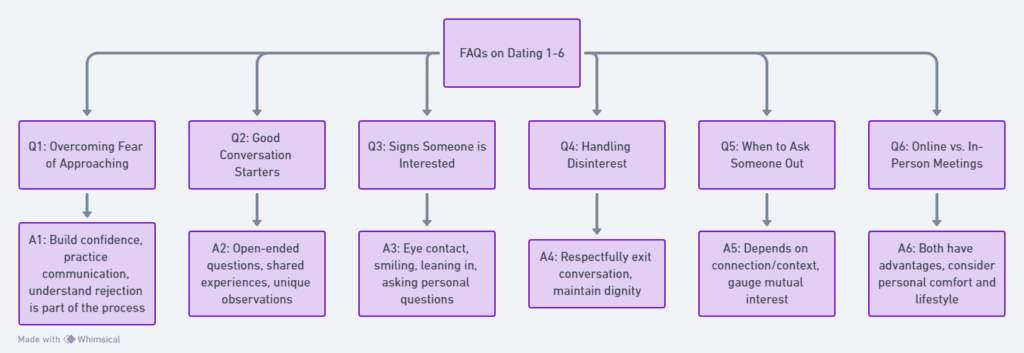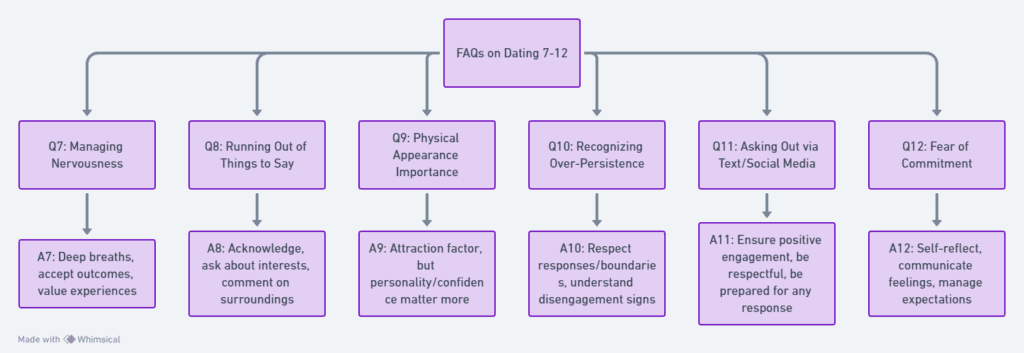Dating Tips for Men
How to Approach
Just hearing the term “Dating Tips for Men: How to Approach” can make many men feel both excited and anxious. The skill of approaching someone you are interested in is full of opportunities for deep connections, but it is also full of possible hazards. It is a dance that calls for poise, self-assurance, and a hint of vulnerability.
Knowing how to navigate the dating scene is more important than ever when social media and online dating platforms drive a steady evolution of dating conventions. This book equips you with the information, methods, and frame of mind needed to date with assurance and authenticity. We will cover all the areas to assist you in developing deep connections, from taking the initiative to politely accepting rejection.
Understanding Modern Dating
The digital revolution has caused the dating industry to undergo a seismic transformation over the past few decades. How we meet and engage with possible partners has changed significantly with the release of dating applications like Tinder, Bumble, and Hinge. However, this ease of use also brings complexity. While carefully managed glimpses into someone’s online profile provide life, the whole picture may be hidden. Discovering a true connection these days requires more than simply discovering someone; it also requires figuring out their digital character.
Conventional dating—meetings through acquaintances, at parties, or in casual settings—remains vital and beloved even in the age of digital dominance. These exchanges provide an unvarnished, unadulterated chance to communicate without technology. Being adaptable and knowing when to value the genuineness of in-person interactions and when to embrace the convenience of digital platforms are essential for navigating the dating scene in the modern era.
Self-Improvement and Confidence
In the dating scene, confidence is more than just a catchphrase—it is the cornerstone of fruitful relationships. However, a strong feeling of self-worth and self-improvement is the foundation of true confidence. It all boils down to embracing who you are, concentrating on your growth areas, and realising your abilities. Here are a few important things to consider:
Proficiency in Communication
Communication proficiency is the cornerstone of both dating and any meaningful human interaction. It involves being clear in what you say, listening intently to others when they talk, and recognising the non-verbal cues that contribute significantly to interpersonal communication. The following are some things to practice:
Building on the groundwork of improved communication skills and self-improvement, let us discuss the how-tos of taking the initiative and overcoming rejection—two crucial dating experiences.
Taking the Lead
Now is the time. You are prepared to approach the person you have noticed who catches your attention. Taking this step may seem like a risky bet, but it can have positive results if done correctly. Here’s how to get through this important stage:
Managing Rejection
Not every strategy will produce the desired results, and that is acceptable. Rejection is a normal part of dating and may be a great teaching tool if handled gracefully. Here’s how to handle rejection positively:
The ability to approach someone you are interested in and gracefully handle the possible consequences is a trait that comes with experience. You will handle these circumstances more easily the more you practice. Recall that the main goal of taking the initiative is to create a space for possibilities; the result, whether a relationship or a lesson gained, is always worthwhile.
In the concluding section, we will answer common questions that may still arise and offer more advice and support for your dating endeavours.

Commonly Asked Questions
Q1: How can I get over my anxiety when I approach people?
A1: The dread of being rejected or the uncertainty of what to say commonly causes people to fear approaching someone. Improve yourself to gain more confidence, then practice speaking in low-pressure settings. Rejection is a normal element of dating, not a reflection of your value. Keep this in mind.
Q2: What are some interesting topics to discuss?
A2: Generally speaking, interesting conversation starters are open-ended and relevant to the circumstance or setting you two are in. You may start a conversation by discovering their viewpoint, bringing up a shared experience, or pointing out something special about them. It is critical to show genuine curiosity in their responses.
Q3: How can I tell if someone is thinking about me?
A3: You can convey interest through spoken words and nonverbal cues. Look for clues like asking personal inquiries, smiling, bending over during a conversation, and keeping a lengthy gaze. However, it is critical to analyse the circumstances and show care for other people’s comfort and personal space.
Q4: What should I do if the other person shows no interest in me?
A4: If the other person seems uncomfortable or disinterested, it is advisable to discontinue the conversation gracefully. Saying something as simple as “It was pleasant chatting with you” shows that you are considerate of their feelings and maintain your dignity.
Q5: When is the right time to ask someone out after meeting them?
A5: There is no single, broadly applicable approach because it depends on the situation and the link. In certain situations, extending an invitation right away could be more advantageous, but it might be better to build rapport with others gradually. Evaluate the exchange to see whether there is comfort and shared interest before extending an invitation.
Q6: Is it preferable to meet people in person or virtually?
A6: In-person or virtual meetings have advantages and can forge strong bonds. Online dating provides access to a wider range of potential partners and can be more convenient for busy schedules. Still, in-person meetings facilitate a more natural finding of chemistry and compatibility. Consider what feels most comfortable and what best fits your interests and lifestyle.
Q7: How do I handle my anxiety before making contact with someone?

A7: Anxiety is a common emotion. Take deep breaths, remind yourself that the worst-case situation is simply a “no,” and remember that every try brings you one step closer to building greater confidence to deal with this. Every experience is valuable because it leads to progress, regardless of the outcome.
Q8: What happens if I can not think of anything to say?
A8: Someone can run out of things to say. If you find yourself in this circumstance, it is acceptable to address it subtly, such as by saying, “I am a little apprehensive, and my mind just went blank.” This candour has a charming quality. To restart the conversation, go back to inquiring about their hobbies or observing your environment.
Q9: When approaching someone, how much impact does appearance have?
A9: Physical appearance might impact attraction, but your attitude, confidence, and social style truly matter. While you focus on grooming yourself beautifully and dressing in a style that gives you confidence, remember that genuine relationships are built on more than appearances.
Q10: What is a good way to know whether you are getting too pushy?
A10: It is important to respect other people’s space and reactions. If they do not contribute much to the conversation, answer quickly, or overtly show their disinterest, it is preferable to back off. Persistence becomes problematic when it disregards the other person’s cues and comfort level.
Q11: Is it acceptable to text or message someone to ask them out?
A11: Depending on the degree of engagement, asking someone out via text or social media has grown in popularity in the current digital era. If you have been interacting well online or if you can’t ask in person due to circumstances, it might be a convenient and comfortable option. But make sure your message is understood and kind, and be ready for a reaction.
Q12: How can I manage my fear of committing or taking action?
A12: A fear of being committed is a common feeling that various anxieties or traumatic events can bring on. It is imperative to think about and face the sources of this dread head-on. Speaking with the person you are dating about your feelings and concerns can also help you manage expectations and build trust.
Concluding Remarks on Dating Advice for Men
Though navigating the dating scene, particularly in the beginning, can feel like treading uncharted waters, the process does not have to be difficult. Making lasting connections can be facilitated by improving yourself, developing your communication skills, learning the subtleties of modern dating, and approaching every encounter with respect and confidence.
Never lose sight of the fact that every interaction, whether or not it leads to romantic love, presents an opportunity for growth and learning. Rejection is merely a redirection and does not represent your worth. Stay true to yourself, be receptive to new ideas, and treat everyone you come into contact with with love and respect.
More than just a manual, Dating Tips for Men: How to Approach encourages readers to appreciate the highs and lows of social interaction. Approach every chance with an open mind and heart; you never know where the adventure will take you.








